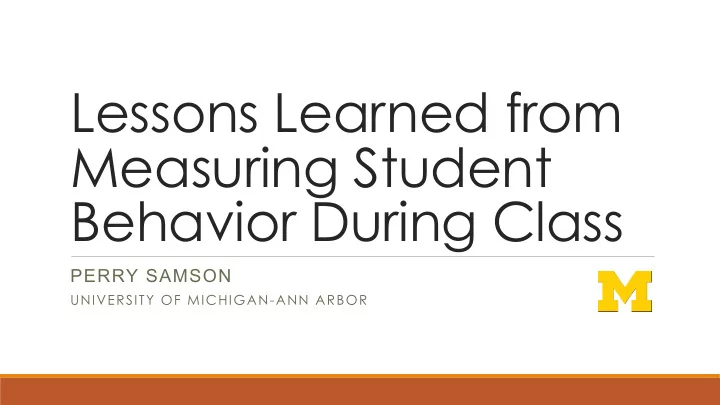

Lessons Learned from Measuring Student Behavior During Class PERRY SAMSON UNIVERSITY OF MICHIGAN-ANN ARBOR
Class Presentation TECHNOLOGY Asynchronous Face-to-Face Synchronous Remote Remote
What Do We Need in the Classroom? q Students should be challenged with a wide range of question types q Students should be able to access my slides q Students should be able to take notes q Students should be encouraged to ask questions q Students should be able to answer each other’s questions q Students should be able to indicate when they’re confused q Student notes should be linked to lecture capture
Creating an Ecosystem LMS Gradebook • Assignments • Collaboration • Interoperability ¡Standards ¡ TLC Student Notes • Student Response • Lecture Capture • Other Textbook • ePortfolio • Content Creation • @PJSAMSON
How to Build Educational Technology Pedagogy ¡ Technology ¡ Use ¡ Assessment ¡ @PJSAMSON
Active Learning Definition Active learning is a process whereby students engage in activities, such as reading, writing, discussion, or problem solving that promote analysis, synthesis, and evaluation of class content. www.crlt.umich.edu/tstrategies/tsal @PJSAMSON
Active Learning
Passive Learning Villemard, 1900 Prediction for the French School in Year 2000
Active Learning “The studies analyzed here document that active learning leads to increases in examination performance that would raise average grades by a half a letter, and that failure rates under traditional lecturing increase by 55% over the rates observed under active learning.” Freeman et al. (2014) Active learning increases student performance in science, engineering, and mathematics PNAS 2014 111 (23) 8410-8415 @PJSAMSON
View ¡Slides ¡ Pose/Review Questions Bookmark Slides Student View ------------------- Note Confusion Take Notes Active Learning Platform Video Capture Screen Capture
Q. When I have questions in class, I am comfortable asking them verbally. The Value of Anonymity in Inquiry @PJSAMSON
Q. When I have questions in class, I am comfortable asking them verbally. The Value of 4.5 158 Number ¡of ¡ Anonymity in 4.0 Avergae Questions/Student students ¡ Inquiry 3.5 413 Number ¡of ¡ 3.0 ques?ons ¡asked 2.5 2.7 Average ¡number ¡of ¡ ques?ons ¡per ¡ 2.0 student 1.5 1.0 0.5 0.0 Female Male @PJSAMSON
Answer Questions Image- Base Questions Optional: Require students to justify their selection. Justify Answers @PJSAMSON
Multiple Choice
Image Quiz
Creating an Ecosystem Notes ¡ Ac?vity ¡ ALendance ¡ Answers ¡ ¡ Ques?ons ¡ Bookmarks ¡ Posed ¡ Learning ¡ Lecture ¡ Analy?cs ¡ Confusion ¡ Capture ¡ Database ¡
Creating an Ecosystem Notes ¡ Ac?vity ¡ LMS ¡ ALendance ¡ Answers ¡ ¡ SIS ¡ Ques?ons ¡ Bookmarks ¡ ¡ ¡ Posed ¡ Learning ¡ University ¡ Lecture ¡ Analy?cs ¡ Confusion ¡ Other ¡ db ¡ Capture ¡ Database ¡ Vendors ¡
In the classroom From my school residence From elsewhere Missing 160 140 120 Number of Students 100 80 60 40 20 0
Assume You Knew Everything Your Students Did as Part of Class NOW WHAT?
Forecasting Student Success Outcomes = b (background) + m (motivation) + p (participation) + l (life) @PJSAMSON
What Participation Affects Learning? • ALendance? ¡ • Taking ¡Notes? ¡ • Par?cipa?ng ¡in ¡Discussion? ¡ • Inquiry? ¡ • Answering ¡Ques?ons? ¡ • Other? ¡ @PJSAMSON
Multiple Courses: Winter 2015 COURSE INSTRUCTOR SIZE M. ¡Gross 103 MOVESCI ¡230 AOSS ¡102 F. ¡Marsik 187
90 Relationship 85 of Student Motivation Exam Scores vs. Grades 80 75 Exam 1 70 Exam 2 Exam 3 65 Low/Some Medium High Truly Interest Interest Interest Excited by
10 Relationship of 8 Classes Attended Attendance vs. Grades 6 4 AOSS 102 2 MOVESCI 230 0 <70 70-80 80-90 >90 Exam 1 Grades @PJSAMSON
Relationship of 120 30 MOVESCI230 Reviewing AOSS102 Lecture 100 25 Capture MOVESCI 230 vs. Grades AOSS 102 80 20 60 15 40 10 <70 70-80 80-90 >90 Exam 1 Grades
400 800 Notes Taken AOSS102/AOSS105 Notes Taken MOVESCI 230 350 700 Relationship of Note Taking 300 600 vs. Grades 250 500 200 400 AOSS 102 150 300 MOVESCI 230 100 200 <70 70-80 80-90 >90 Exam 1 Grades @PJSAMSON
180 160 140 Relationship of Slides Viewed Slide Viewing 120 vs. Grades 100 80 60 40 AOSS 102 20 MOVESCI 230 0 <70 70-80 80-90 >90 Exam 1 Grades
100 90 Exam #1 Score 80 70 60 50 40 1.0 2.0 3.0 4.0 Incoming GPA
Do High GPA Students behave Differently from Low GPA Students? IS IT A DIFFERENCE IN COGNITIVE ABILITY -OR- IS IT A DIFFERENCE IN MOTIVATION OR STUDY SKILLS?
Successful Students Behave Differently 25 Capture Viewed per Minutes of Lecture 20 Class 15 10 5 0 <2.5 2.5-3.0 3.0-3.5 >3.5 Incoming Grade Point Average @PJSAMSON
12 Number of Classes Attended 10 8 Attendance by 6 itself is a poor predictor of student success. 4 2 0 <2.5 2.5-3.0 3.0-3.5 >3.5 Incoming Grade Point Average
350 Number of Slides Viewed 300 250 200 150 100 50 0 <2.5 2.5-3.0 3.0-3.5 >3.5 Incoming Grade Point Average
140 Low GPA students 120 Number of Notes Taken take five times fewer than high GPA students. 100 80 60 40 20 0 <2.5 2.5-3.0 3.0-3.5 >3.5 Incoming Grade Point Average
Lessons Learned 1. Student exam scores are related to in-class participation measured as slides viewed, notes taken and more. These terms should be valuable both for predictive analytics and as a basis for development of personalized feedback. 2. Levels of student participation are related to students’ incoming grade point average. This supports the possibility that low grade point students lack motivation or study skills rather than cognitive ability. @PJSAMSON
Thank you Blog: www.sageonstage.com Email: samson@umich.edu @PJSAMSON
Recommend
More recommend